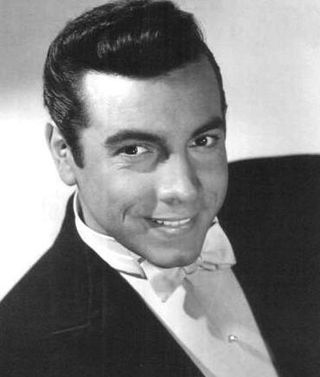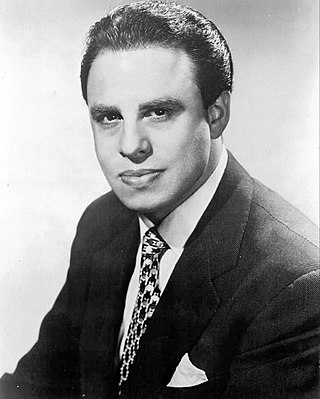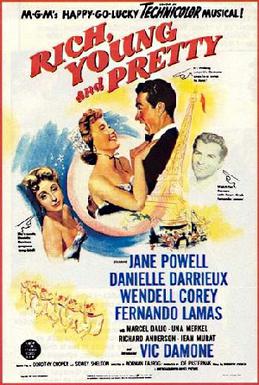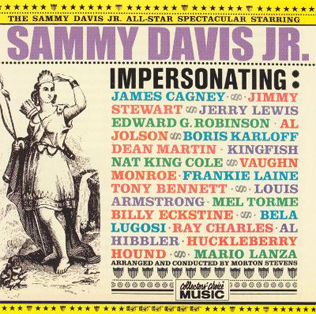
Samuel Cohen, known professionally as Sammy Cahn, was an American lyricist, songwriter, and musician. He is best known for his romantic lyrics to films and Broadway songs, as well as stand-alone songs premiered by recording companies in the Greater Los Angeles Area. He and his collaborators had a series of hit recordings with Frank Sinatra during the singer's tenure at Capitol Records, but also enjoyed hits with Dean Martin, Doris Day and many others. He played the piano and violin, and won an Oscar four times for his songs, including the popular hit "Three Coins in the Fountain".

Renata Tebaldi was an Italian lirico-spinto soprano popular in the post-war period, and especially prominent as one of the stars of La Scala, San Carlo and, especially, the Metropolitan Opera. Often considered among the great opera singers of the 20th century, she focused primarily on the verismo roles of the lyric and dramatic repertoires. Italian conductor Arturo Toscanini called her voice "la voce d'angelo", and La Scala music director Riccardo Muti called her "one of the greatest performers with one of the most extraordinary voices in the field of opera."

Mario Lanza was an American tenor and actor. He was a Hollywood film star popular in the late 1940s and the 1950s. Lanza began studying to be a professional singer at the age of 16. After appearing at the Hollywood Bowl in 1947, Lanza signed a seven-year film contract with Louis B. Mayer, the head of Metro-Goldwyn-Mayer, who saw his performance and was impressed by his singing. Prior to that, the adult Lanza sang only two performances of an opera. The following year (1948), however, he sang the role of Pinkerton in Puccini's Madama Butterfly in New Orleans.

George London was an American concert and operatic bass-baritone.

Frances Yeend was an American classical soprano who had an active international career as a concert and opera singer during the 1940s through the 1960s. She had a long and fruitful association with the New York City Opera (NYCO) between 1948 and 1958, after which she joined the roster of principal sopranos at the Metropolitan Opera where she sang between 1961 and 1963. She also had an extensive concert career, particularly in the United States. By 1963 she had sung in more than 200 orchestral concerts in North American with major symphonies like the New York Philharmonic, the Boston Symphony Orchestra, the Philadelphia Orchestra, the Cleveland Orchestra, and the Chicago Symphony Orchestra among others.

Mario Lanza: Opera Arias and Duets is a compact disc from RCA Victor released October 8, 2001, of recordings re-mastered in 1999. At the time of its release, it was the only all-operatic Mario Lanza CD collection that RCA has issued. It includes several previously unreleased versions of a number of operatic arias associated with Lanza, together with the duet "Dio ti giocondi" from Otello with soprano Licia Albanese, the Improvviso from Andrea Chénier, and "M'appari" from Martha. The CD also includes four recordings from The Mario Lanza Radio Show. Writing in Records and Recordings in October 1967, the critic Delcie C. Howard described Lanza's recording of the Improvviso featured here as "a well-nigh model account of this impassioned outpouring".
"Be My Love" is a popular song with lyrics by Sammy Cahn and music by Nicholas Brodszky. Published in 1950, it was written for Mario Lanza, who sang it with Kathryn Grayson in the 1950 movie The Toast of New Orleans. The song was nominated for the Academy Award for Best Original Song in 1950 but lost to "Mona Lisa". He recorded it on June 27, 1950, with Ray Sinatra's orchestra.

Because You're Mine is a 1952 American musical comedy film starring Mario Lanza. Directed by Alexander Hall, the film also stars Doretta Morrow, James Whitmore, and Bobby Van.
"It's Magic" is a popular song written by Jule Styne, with lyrics by Sammy Cahn, published in 1947. They wrote the song for Doris Day in her Warner Brothers film debut, Romance on the High Seas. In the autumn of 1948 Vic Damone, Tony Martin, Dick Haymes, Gordon MacRae and Sarah Vaughan all charted on Billboard magazine charts with versions of the song, but none as successfully as Day's recording. "It's Magic" received an Academy Award nomination for Best Song, but in March 1949 lost to "Buttons and Bows" by Jay Livingston and Ray Evans.
Canzone napoletana, sometimes referred to as Neapolitan song, is a generic term for a traditional form of music sung in the Neapolitan language, ordinarily for the male voice singing solo, although well represented by female soloists as well, and expressed in familiar genres such as the love song and serenade. Many of the songs are about the nostalgic longing for Naples as it once was. The genre consists of a large body of composed popular music—such songs as "'O sole mio"; "Torna a Surriento"; "Funiculì, Funiculà"; "Santa Lucia" and others.
"Che gelida manina" is a tenor aria from the first act of Giacomo Puccini's opera, La bohème. The aria is sung by Rodolfo to Mimì when they first meet. In the aria he tells her of his life as a poet, and ends by asking her to tell him more about her life. It is one of the most recorded arias by tenors.
Nicholas "Slug" Brodszky was a composer of popular songs for the theatre and for films.

Rich, Young and Pretty is a 1951 American musical comedy film produced by Joe Pasternak for Metro-Goldwyn-Mayer and directed by Norman Taurog. Written by Dorothy Cooper and adapted as a screenplay by Cooper and Sidney Sheldon, it stars Jane Powell, Danielle Darrieux, Wendell Corey, and Fernando Lamas, features The Four Freshmen, and introduces Vic Damone. This was Darrieux's first Hollywood film since The Rage of Paris (1938).
Many artists have released video and audio records of their live performance at the Hollywood Bowl, an amphitheater in Los Angeles:
"Because You're Mine" is a song written by Nicholas Brodszky with lyrics by Sammy Cahn taken from the 1952 musical film of the same title. It was recorded by Mario Lanza and Nat King Cole in two different versions, which were both released as singles in 1952. In the US, Lanza's record reached No. 7 in the Billboard charts and Nat King Cole's version achieved the No. 16 position. The Mario Lanza recording also reached No. 3 in the UK Singles Chart, spending 24 weeks within the top 12, and was Lanza's only UK Top 12 hit. The Nat King Cole recording was included on his album Top Pops, placed three spots lower and spent three weeks on the chart. The Mario Lanza recording was one of his three million-selling singles.

The Academy Award-Winning "Call Me Irresponsible" and Other Hit Songs from the Movies is the fourteenth studio album by American pop singer Andy Williams and was released in the spring of 1964 by Columbia Records. Williams had already had great success with his albums named after Henry Mancini's Oscar winners from 1961 and 1962, "Moon River" and "Days of Wine and Roses", and was asked to sing Mancini and Johnny Mercer's title song collaboration from the 1963 film Charade at the Academy Awards on April 13, 1964, after it was nominated for Best Original Song, but the winner that year was the other song that Williams performed at the ceremony, "Call Me Irresponsible".
The following is a discography of original albums and singles released by American singer Mario Lanza.

The Sammy Davis Jr. All-Star Spectacular is a 1962 studio album by Sammy Davis Jr. arranged by Morty Stevens. The first half of the album features Davis' impersonations of popular entertainers and celebrities.
"Wonder Why" is a song written by Nicholas Brodszky (music) and Sammy Cahn (lyrics), published in 1951.

Cesare Antoniolli was an Italian composer, arranger and orchestral director of popular music active during the 1900-1960 period. He composed music alongside notable lyricists, arranged music for major publishers, and directed his own orchestra backing popular singing stars on their recordings.
The orchestra was variously nominated as Orchestra Antoniolli, Orchestra da Ballo Antoniolli, Orchestra Melodica Napoletana Antoniolli and Orchestra Tropical Antoniolli. He played an important creative part in the survival and subsequent post-war rebirth, of Italy's popular music scene.










